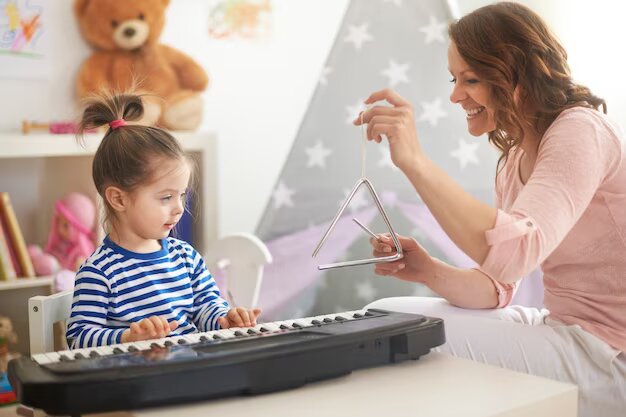Numerous studies conducted over the years by educationists and neurophysiologists have demonstrated that music significantly impacts human development, particularly children’s cognitive and physical growth in music and movement classes.
It is thought that exposure to music, mainly when children are toddlers or even before they are born, profoundly affects the cerebral cortex area. It develops neural connections in the brain that help people comprehend language and the outside world more quickly and easily.
What kind of an impact would playing musical instruments have on kids if just listening to music had such a profound effect? Learning music in school has a variety of advantages for students.
Education in music is of utmost importance because it promotes improved brain development, personal connection, academic improvement, socialisation, and stress reduction.
When should you introduce music classes to your children?
THE MUSIC SCIENTIST believes that parent-toddler programmes that expose children to music and toys that promote free play and movement will benefit children as young as 1.5 years old. By the time they are 4 years old, rhythm and melody will be introduced in a way they can grasp, and they will be ready to enrol in brief music lessons. Children’s beginning music classes should emphasise both music and movement. Kids learn to play simple instruments in addition to how to dance to the beat of the music. Learn more about the top beginner instruments for kids.
Benefits of Music & Movement for kids
Expression
In infant music classes, kids learn to express their feelings, especially deep feelings that they may not be able to express clearly through the spontaneous movement of songs and dances. This improves their ability to communicate nonverbally.
All-round development
This is a lot of fun and may appear too young children to be pure delight. Still, it also serves as a foundation for their future development into emotionally intelligent, well-rounded individuals. They gradually start to know who they are and feel at ease with themselves as they grow up and become unrestrained, even in groups. Unbeatable preparation for the challenging adult world and those difficult teenage years. Notably, there is a rhythm to life that enhances harmony in life if we follow it; these sessions help children become aware of this rhythm.
Retention of inherent nature
Children’s movements are attractive because they are unpolished, free, natural, and authentic, much like nature intended us to be. Unfortunately, they gradually lose their individuality and originality as they merge into larger groupings and turn into a product on an assembly line. Preschool music and movement is the ideal class to help your kids maintain their “true” selves and develop their abilities.
Help With Better Problem-Solving.
It is believed that music and mathematics complement one another. Students that are strong at music are adept at solving mathematical issues like algebra and geometry, and music instruction aid in the development of cognitive talents. Researchers think that the same area of the brain activated by music is also involved in thinking through issues and coming up with solutions.
Multicultural exposure
Children get to experience music from all across the world in these classes. They acquire knowledge of various dialects, cultures, and customs through music. This enables them to easily interact and blend into diverse society and the wider world.
Help to Remove Stress.
All students are like us. They may experience Stress due to various things, including rivalry among students to remain at the top of the class, fluctuating grades, or exam preparation. This may be physically and emotionally exhausting. Students who take music programmes at school can reduce Stress and depression, reducing physical health problems. By relaxing and synchronising their movements to the children’s music class, pupils in school music classes can better focus on their studies.
Music and movement games engage all of the senses.
All kids benefit from engaging the senses through physical activities when learning. Children with autism spectrum disorders, however, require additional opportunity and experience in a particular area.
The brain is stimulated when the senses are used. It builds brain connections and enhances sensory processing mechanisms. Additionally, it enhances social abilities, including cooperation and communication.
Music and movement activities for preschoolers
Preschoolers get better at enjoying music and movement class activities as they age. Educators can incorporate more musical elements and complex dance techniques.
They use musical toys or make their own out of natural materials and spare pieces. Preschoolers enjoy creating music with musical toys made to teach kids about music.
To engage all of their senses, utilise instruments that stimulate your child’s auditory and tactile senses, such as drums, cymbals, chimes, or bells.
Displaying one’s individuality. Because it enhances how they naturally express themselves, preschoolers like music and dance in early childhood education.
They frequently move to various musical tempos and rhythms, like animals like elephants or birds. Preschoolers enjoy moving, and incorporating music offers the ideal setting for activities to introduce them to music notation.
Improve coordination, balance, and rhythm by teaching kids simple dancing moves.
Using various musical genres to assist kids in concentrating better, promoting memory skills, and fostering imagination.
With their friends, toddlers can engage in music and movement classes activities to help them acquire important skills for starting school.
Final Talk
These multiple benefits of Music and Movement classes make it an ideal first class for young kids; it has also been proven to have multisystem benefits for those with autism.
Where music and movement, learning, and fun merge is where you find THE MUSIC SCIENTIST! Make sure your child is part of THE MUSIC SCIENTIST family – a lifelong musical bond!









































